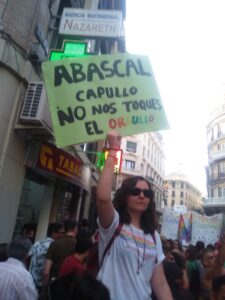
On a sweltering June day in 2005, jubilation broke out in the public gallery of the Spanish Parliament. Equal marriage had finally become the law of the land. The Franco generation of LGBTQ activists could scarcely believe how far the country had come since it emerged from the shadows of a forty-year dictatorship. During the Franco Regime, same-sex activity was punishable by imprisonment, torture, and death; and when Spain finally transitioned to democracy in the late 1970s, homosexuality was still illegal. Yet just over two decades on, Spain became only the third country in Europe to legalize equal marriage.
At the time, the move was met with fierce resistance from the reconstituted remains of the Franco Regime, which had morphed into the Popular Party (PP). After years in the political wilderness, they finally entered government between 1996 and 2004, putting a break to fifteen years of progressive reform. They returned to office again in 2011, but by then Spanish society had moved on. Seeing little electoral advantage in wedge issues like equal marriage, the party ceded significant ground on minority rights. The PP´s Damascene conversion, however, provoked considerable dissent in the far right of the party, its disgruntled members eventually finding a home in Vox, a political formation that pledged to uphold “the true conservative values” abandoned by the PP in their search for center ground votes.
Vox’s major breakthrough came in the 2017 regional elections in Andalusia, the first openly fascist representation on a legislative body in Spain since the death of Franco. Vox went on to win 54 seats in the 2019 general election, becoming the third largest party in Parliament, and one with an openly homophobic agenda. The fundamental problem, as Ruben Lopez, head of the Observatory for anti-LGBT phobia explains, “Vox has broken the consensus,” which had held among all parties since Madrid introduced LGBTQ anti-discrimination legislation in 2016. According to Lopez, “Those intolerant [of the LGBT community]had lacked a voice that would represent them. Vox is now seizing those votes,” and making itself indispensable to the PP´s governing ambitions in the process.

The Popular Party’s pandering to the far right agenda began in earnest in 2019 with the election of their Trump-lite candidate, Isabel Diaz Ayuso, president of The Community of Madrid. Notorious for her tenuous grasp of policy detail and her “Ayusismos,” which detail her random pronouncements of dubious veracity on everything from children’s nutrition to climate change. Ayuso is also possessed of a low Trumpian cunning. In a snap election in May 2021, her light policy “Beers and Freedom” campaign deftly exploited public weariness with new COVID measures, propelling her to a resounding electoral victory. Her other key strategy was the shameless courting of the Far Right, to such an extent that she is now more popular with Vox voters than is their party leader. The love-in continued in government with Ayuso, just four seats short of an overall majority, relying on the far right to put her over the top.
In collaboration with the ultraconservative Catholic campaign group Hazte Oír (“Make you hear”) during the course of that 2021 campaign, Vox announced a series of election pledges, including the restriction of abortion rights and the rolling back of LGBTQ protections. Less than a month after the election, Vox brought to the floor of the regional assembly a proposal to derogate the 2016 regional law on identity and gender expression and integral protections against LGBTI-phobia. The explicit reference to the LGBTQ community was deleted and replaced with a generic reference to discrimination. With Ayuso abstaining, the proposal was roundly defeated by the opposition; but the failure of the PP to explicitly defend its own flagship rights legislation, which was passed by the party just five years prior, was an ominous sign of things to come.
In the run up to regional elections that took place at the end of last month, Ayuso was anxious to cement her status as future party leader by returning as President of the community, and achieving the overall majority that narrowly eluded her in 2021. And with COVID firmly in the rear-view mirror, she went on another charm offensive with Far Right voters. In December, after months spent teasing the prospect, Ayuso formally committed to repealing the regional laws on gender expression and identity. She explained in an ominously-worded statement, her intention to “replace it with something more sensible.” It was a gambit that paid off handsomely, with Ayuso achieving both her aims. She will now be under intense pressure to make good on the anti-trans promises she made to her new far right supporters. While in legislative terms, repealing the law may have limited effect, as groundbreaking federal trans legislation passed last year overrides it, the mere prospect of a derogation is endangering LGBTQ educational initiatives in the region and emboldening already growing opposition to these programs.

In a disturbing interview with Vice World News in late 2022, Ana Silva, a longtime volunteer therapist with the prominent LGBTQ rights organization COGAM (The LGBTQ Collective of Madrid), which runs diversity workshops in secondary schools, describes how, for the first time, one of her classes turned violent: “[The teenagers] were lifting their desks up and down, banging them against the floor. Then they started to approach us – they told us we should die.” Silva has little doubt that the noisy rise of Vox is giving Trump-style license to open displays of bigotry. Targeting this part of the school curriculum has long been a priority for groups like Hazte Oír, but now they have a major political party aiding their efforts.
Other Vox attacks on inclusion target issues of parental rights and child protection. In the southwest autonomous community of Murcia in 2021, a Vox regional stronghold, the Party succeeded in introducing the so called “pin parental,” which effectively allows parents to withdraw their children from public school classes discussing the subjects of inclusion, sexual diversity, and gender identity. Although Ayuso has, thus far, refused the party’s request to introduce the same measure in Madrid, her track record of expediency regarding the far right suggests it may only be a matter of time.
The party´s latest sinister scheme is a proposal to combat the “indoctrination of children in schools” by limiting discussion of LGBTQ issues in the classroom, a measure not dissimilar to Florida’s “Don’t Say Gay” law. While the proposal has no immediate prospect of success, it serves the useful purpose of stirring up hate as Spain faces a raft of elections– regional, municipal and national – through the course of 2023. Perhaps the most worrying development of all is the alarming rise in LGBTQ hate crimes that have accompanied Vox’s normalization of hate speech over the last five years. Particularly shocking was the murder in 2021 of nursing assistant Samuel Luiz outside a nightclub in the northwestern region of Galicia, his assailants screaming the F-word at him as they beat him to death; this being just one of the most egregious examples among the thousands of LGBTQ hate crimes reported over the last few years.
COGAM and other Madrid-based LGBTQ rights groups have reacted with alarm to the Vox´s rolling campaign of hate and its deleterious effects, which they describe as nothing less than an attempt to “erase us from public life, push us back in the closet, and make us live like [we did]forty years ago, in fear, without recognition and without rights.” However, with Ayuso and the PP so entrenched in the region, it is unclear what activists can actually do in terms of political pushback. Madrid, the richest region in the country, has been ruled continuously by the PP for almost thirty years, and the party has just been comfortably re-elected with an enhanced mandate. As José Castaño, an activist with the main opposition party Mass Madrid, bluntly puts it, “There are plenty of well-to-do PP voters who don’t much care if the president is corrupt, incompetent or panders to fascists, as long as she cuts their taxes.” This is something Ayuso has done repeatedly, and as recently as this past January.
The slew of regional and municipal votes that took place across the country at the end of May saw both the PP and Vox make substantial gains, forcing the progressive coalition government to call a snap general election, slated for July 23rd. Unless there is a radical shift in the current polling, the PP will almost certainly need Vox’s fifty odd seats to oust the current progressive coalition and return to power. Though this will give the party considerable clout at a national level, their progress to date has valuable, if unpalatable, lessons for political activists and advocates of the LGBTQ community that extend far beyond Spain: in an increasingly fractured European political landscape, a bigoted minority with the right leverage has the potential to endanger hard won progress on LGBTQ rights, and challenges the long held assumption that, to paraphrase MLK, the arc inevitably bends towards inclusion.
 John Boyce an Irish freelance journalist who divides his time between Spain and Iceland. He has written for a wide variety of publications, including Iceland Review, History Ireland, Barcelona Metropolitan, and Private Eye, and is a regular feature writer on politics, history and LGBTQ issues for Madrid Metropolitan magazine. His portfolio can be accessed here.
John Boyce an Irish freelance journalist who divides his time between Spain and Iceland. He has written for a wide variety of publications, including Iceland Review, History Ireland, Barcelona Metropolitan, and Private Eye, and is a regular feature writer on politics, history and LGBTQ issues for Madrid Metropolitan magazine. His portfolio can be accessed here.






